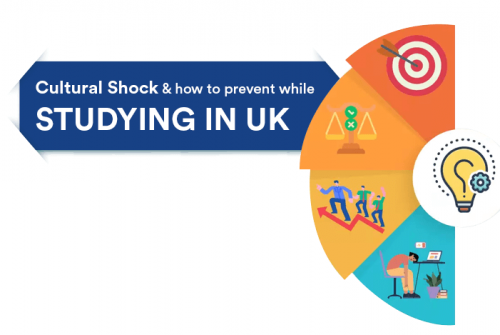
Cultural Shock:
How to Prevent It While Studying in the UK

Studying in the UK comes with a number of benefits. Studying abroad has several benefits. Millions of students decide to pursue their university education abroad for a number of reasons, including receiving an excellent education, experiencing a new country, finding new employment prospects, and establishing a better future for themselves. Living abroad is not always easy, though. Culture shock is one of the many difficulties that students have when they study abroad. Studying abroad involves adapting to a completely different culture and ways of life. The good news is that it is possible to get over cultural shock. We have covered culture shock when studying abroad in this content, along with ways of overcoming it.
International students may face culture shock when arriving in a new country because they will be engaged in a culture that is completely distinct from their own. While dealing with and adapting to new experiences, culture shock is the term used to describe feelings of confusion and disorientation. International students often suffer from culture shock since studying abroad is a significant life transition that can be extremely intimidating. The way people act, dress, interact, and even teach in your native country could differ significantly. Therefore, experiencing culture shock when studying abroad is common.
Culture shock can be caused by a number of matters, such as language challenges, differences in social customs, cuisine, weather, and educational systems. International students studying in the UK may face difficulties managing transportation, adjusting to academic expectations and teaching styles, comprehending culture, and dealing with the country's weather, among other issues.
If you've traveled or you're traveling abroad to study, you probably can't wait to experience a new culture and way of life. You might still experience culture shock, either. Fortunately, there are many ways of handling the issue of culture shock and it is possible to overcome it. Take a look at the tips below to avoid culture shock when studying abroad.
Researching the local way of life in advance is one of the best ways to manage culture shock when studying abroad. If you're going to a university in the UK, for instance, learning about the local way of life before you arrive can be beneficial. This will enable you to blend in and learn how to communicate with locals. Because you'll be ready to handle the cultural differences, it's also helpful for getting over culture shock.
It's natural to lose sight of the wonderful elements of studying abroad when you're experiencing culture shock at university. Consider the good things that exist and how much you have to look forward to, rather than focusing on the things you miss. Studying abroad might cause culture shock, but you don't have to let it overwhelm you. To get a deeper understanding of your host country, embrace the experience and explore the area. Familiarizing yourself with the university's transportation system, customs, and surroundings can greatly enhance your comfort level and potentially reduce the effects of culture shock.
Making the most of your experience while studying abroad is another popular method of overcoming culture shock. You'll get the chance to socialize with new people from around the world. Establish connections and make new friends. There are students in your country who can relate to you. You can make friends with people from different cultures while also making an effort to share your own culture and learn about theirs. Join societies and clubs to help you get over your university's culture shock. You'll meet people who share your interests in this way and create friendships for lifetime.
Homesickness is one of the factors that complicates culture shock. It could take a while to get used to because you won't be able to reach your friends and family as much back home. Stay in touch with your family and friends and inform them of how you're doing . To help you cope with culture shock, talk about your experiences and keep up your relationships.
Studying abroad can be extremely helpful and is a wonderful experience. You can work toward bettering your future and have access to incredible educational possibilities while learning about a new nation and culture. Studying abroad can cause cultural shock, which can be unsettling, but it's essential to know you're not alone. The experience is shared by many, and it is possible to get over culture shock. We really hope that our advice on preventing culture shock will be helpful to you and enhance your time spent studying abroad!